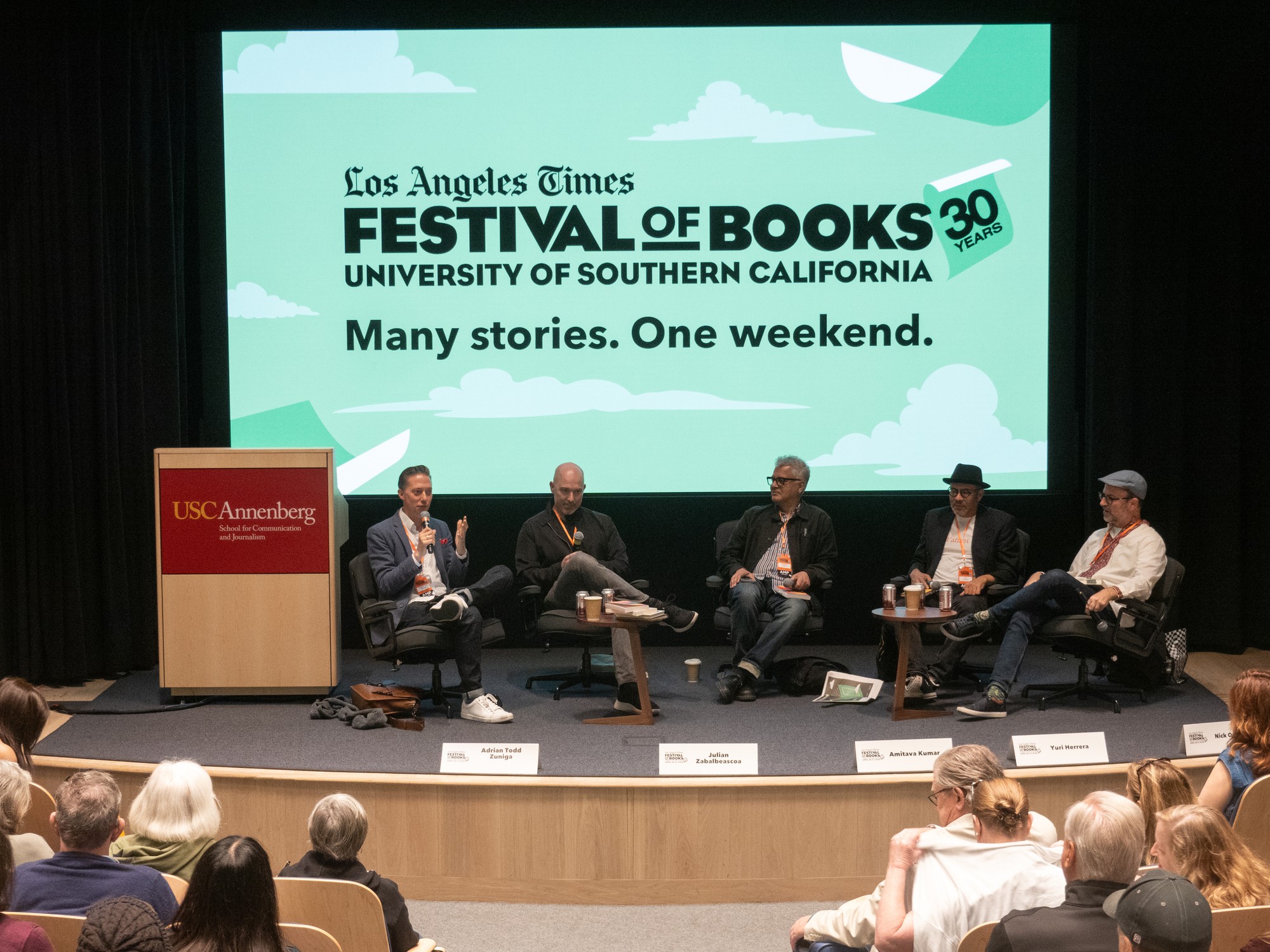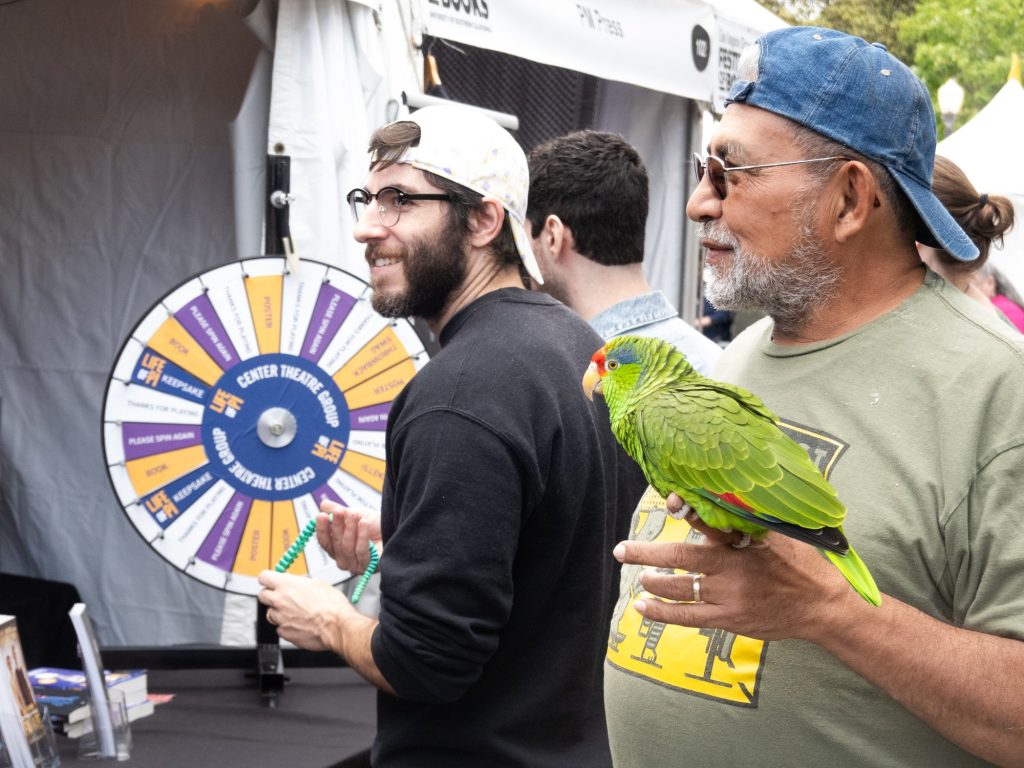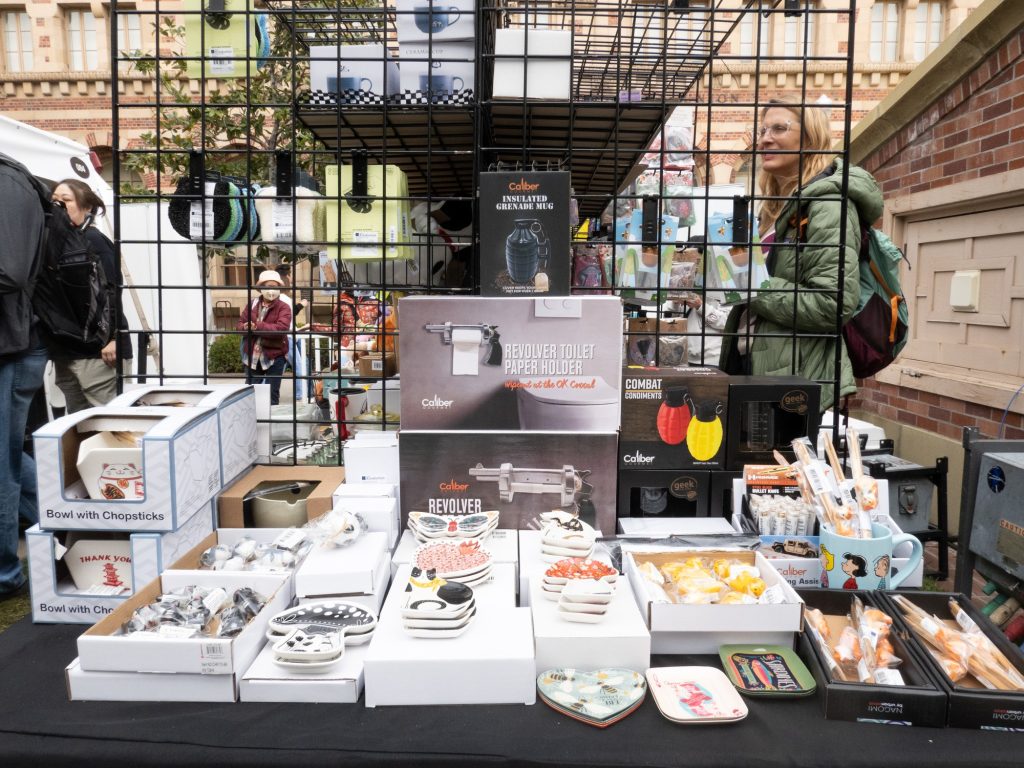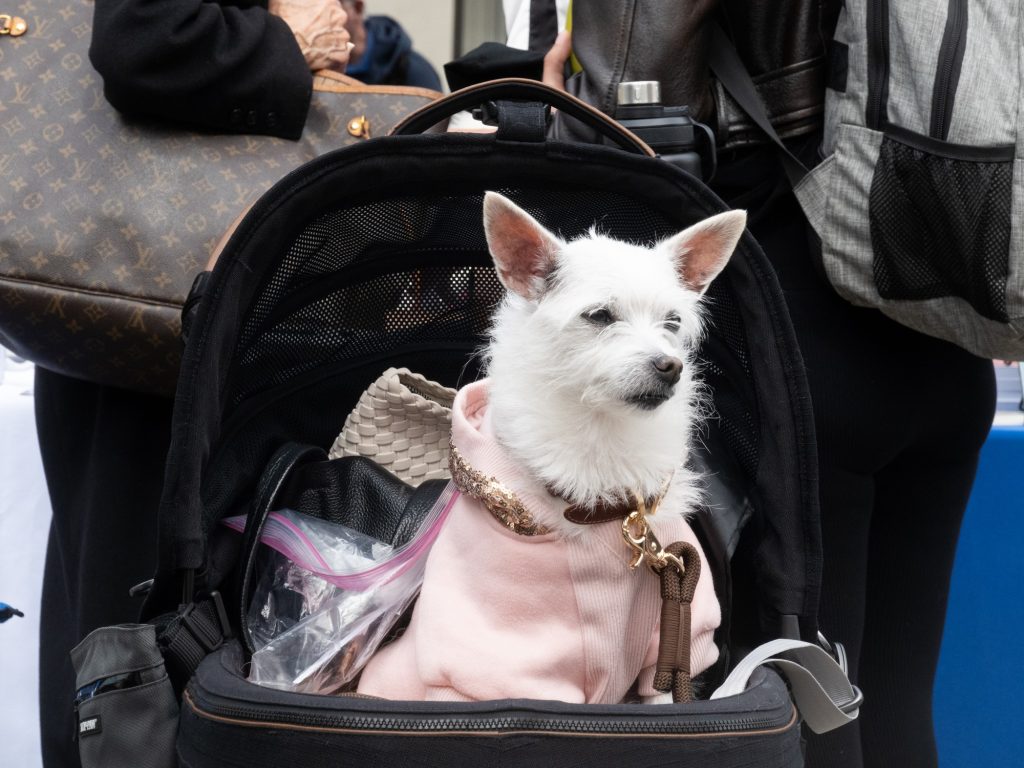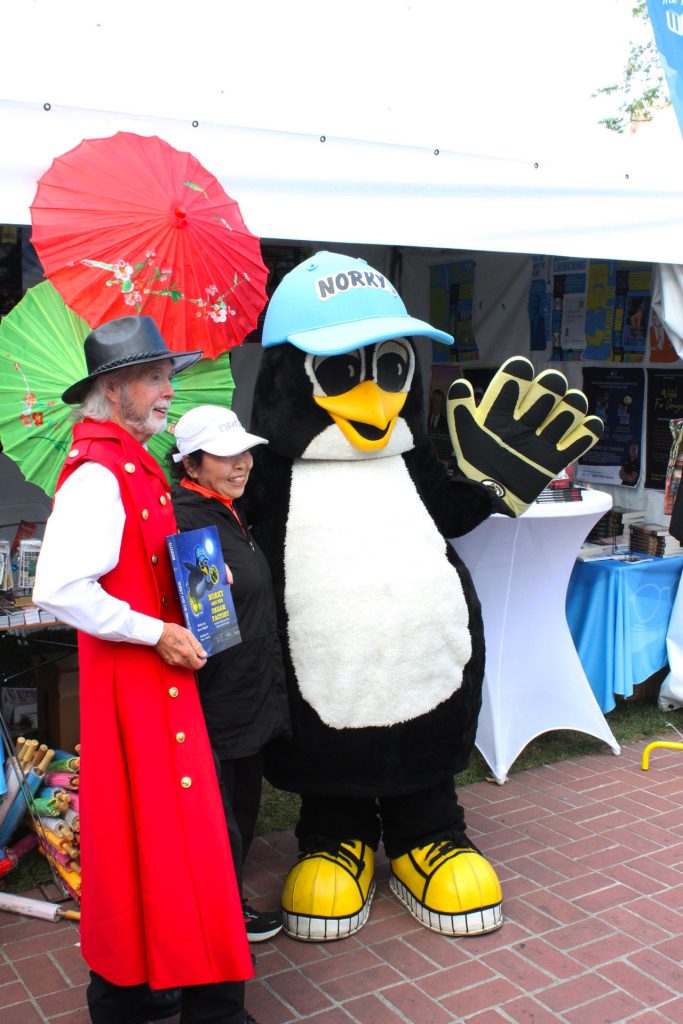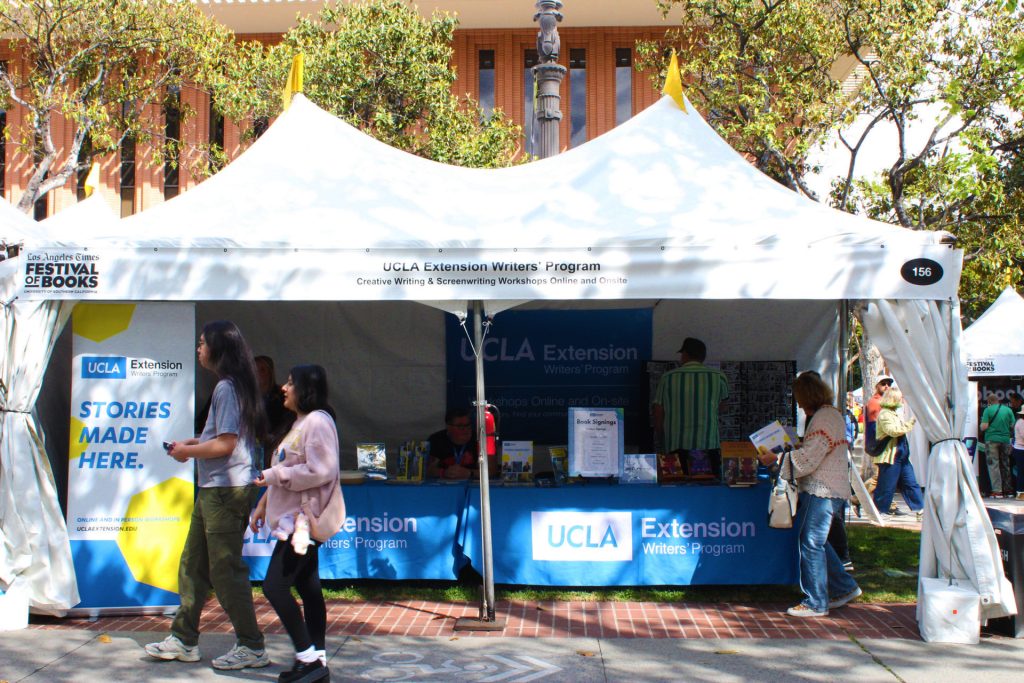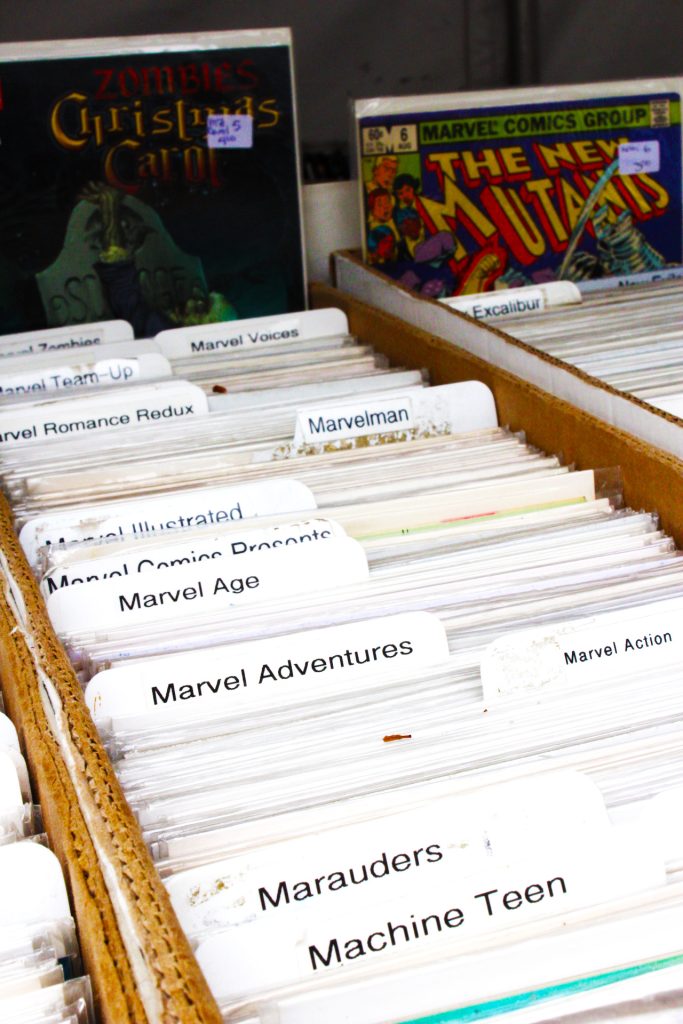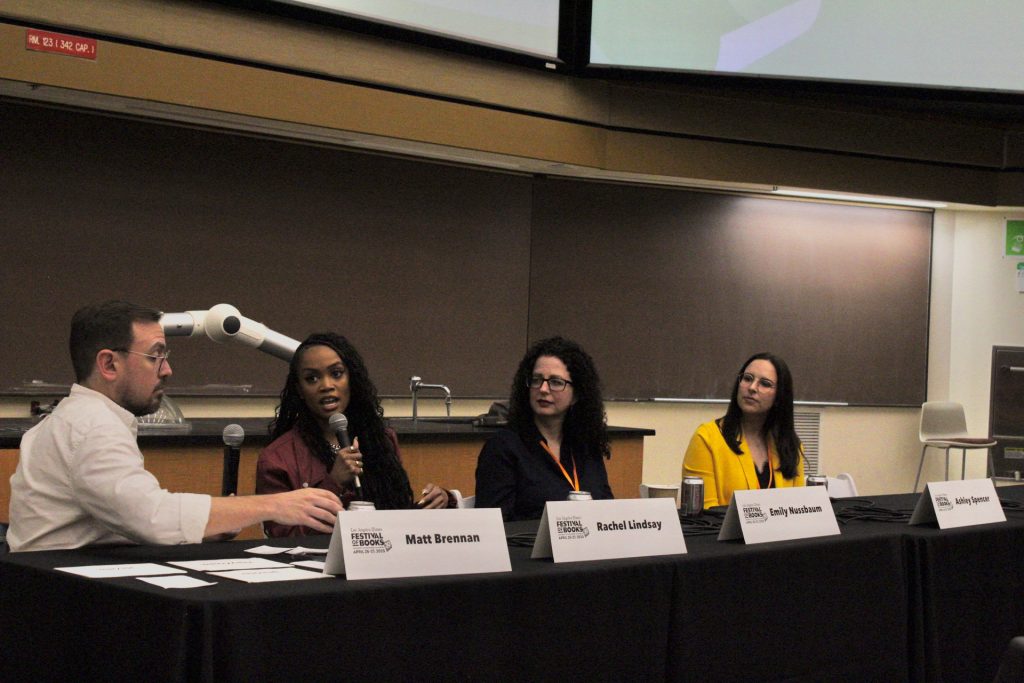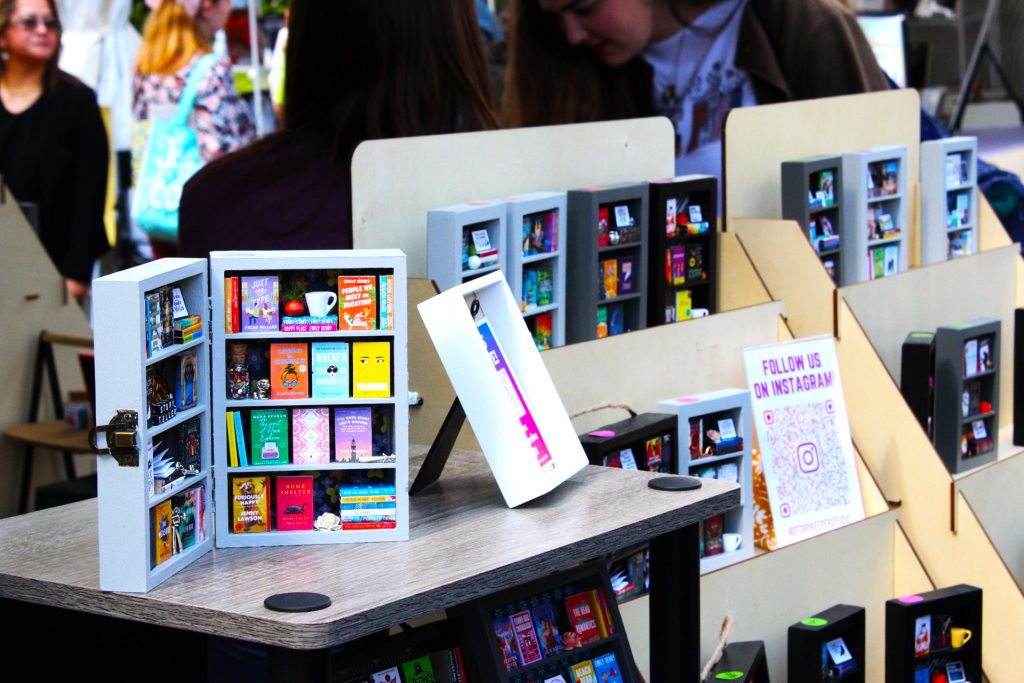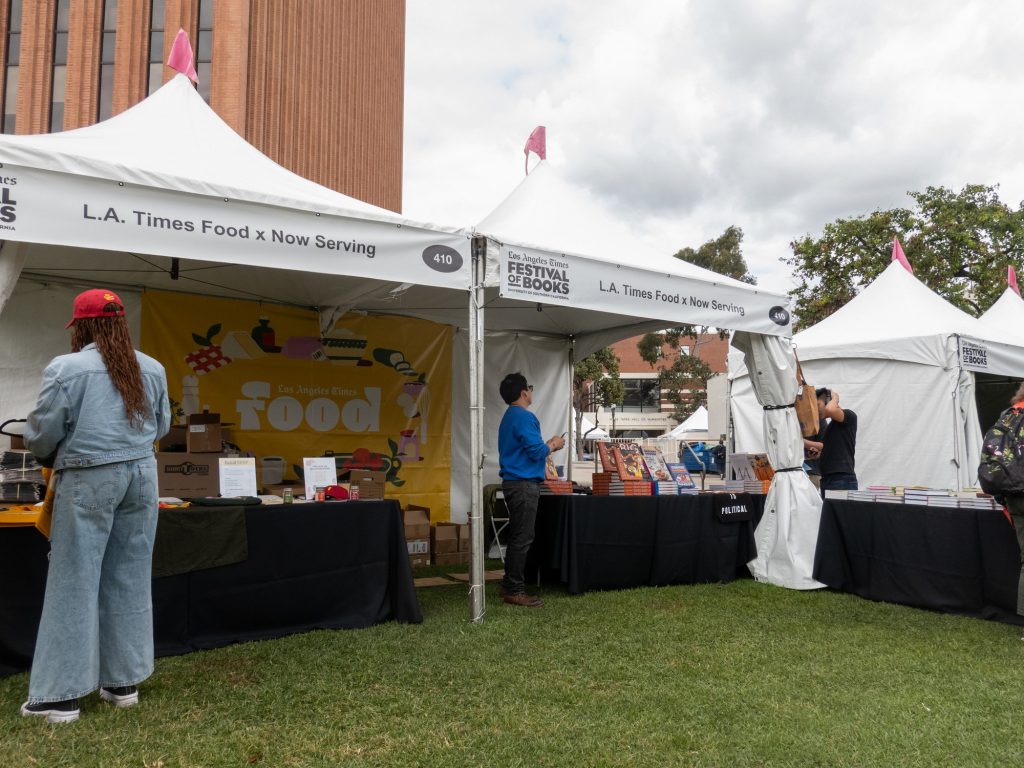
The LA Times Food section takes over a whole corner of the Festival to display their selected cookbooks and invited guests. Photographed by Finn Martin/BruinLife.
For the 30th year in a row, the avid readers of Los Angeles convened to attend the world’s largest book convention, the LA Times Festival of Books. Drawing an estimated crowd of over150,000 to the USC campus, the Festival and its more than 200 organized events can be considered a magnet to the world of literature, and more broadly, culture. Join us as we take you through the Festival to talks with old world historical fiction writers, food comedians, Presidential biographers, Josh Gad, Jon Chu, TV insiders and romance panelists that include a former Bachelorette!
The Old World is Right Behind You: The Role of the Historical Novel
(Left to right) Adrian Todd Zuniga, Julian Zabalbeascoa, Amitava Kumar, Yuri Herrera, and Nick Owchar reflect on the worlds of yesterday that remain with them in their writings. Photographed by Finn Martin/BruinLife.
Answering questions about their intention designing their historical novels, the panelists took the audience through the footsteps of exiled presidents to be in New Orleans (Yuri Herrera’s “Season of the Swamp”), the Basque country during the Spanish Civil War (Julian Zabalbeascoa’s “What We Tried to Bury Grows Here”), the insomniac hauntings of a Catholic priest in Ukraine (Nick Owchar’s “A Walker in the Evening”) and the travels of a boy from his childhood home in India (Amitava Kumar’s “My Beloved Life”).
Here are their stories:
“Season of the Swamp” by Yuri Herrera
A professor of literature and fellow at Tulane University, Yuri Herrera, has a relationship with New Orleans that impassioned his recent novel. He used it to set the story of the exile of Benito Juárez, the first Indigenous president of Mexico, and examines a period of time hitherto untouched. Herrera acknowledged that much might be imagined as there are only three existing documents on Juárez’s time spent exiled in New Orleans, yet he used this absence to his advantage to explore his “own relationship with the city” and to comment on what it means to be in exile in a time when “migrants are escaping criminals and criminals are rising into positions of power.”
“What We Tried to Bury Grows Here” by Julian Zabalbeascoa
For writers like Julian Zabalbeascoa who descend directly from the Spanish Civil War, the story of fascism versus republicanism remains palpably present. Zabalbeascoa’s novel counterpoints the rise of Spanish Fascism with his own Basque heritage. He shared how his father had moved from the Basque country, an autonomous community of Spain, to become a Central Valley shepherd. Interested in retracing his ancestry and inspired by the Nobel Laureate author Svetlana Alexievich and her work with oral histories, Zabalbeascoa decided to interview his family, uncovering vivid stories from the war. Single stories like these informed the 20-chapter piece told through 20 different perspectives. He only wished his novel about the dangers of autocracy was published before the recent election and not as an afterword to it.
“A Walker in the Evening” by Nick Owchar
Nick Owchar thanked the many imitators of Dan Brown’s “Da Vinci Code” who he thought he could beat for inspiring him to write his novel set in western Ukraine. Owchar turned his attention to two stories that have stayed with him through his career. He first wrote his story about the life of the poet Dante Rossetti, a man who buried his life’s poems with his wife only to later exhume the body in order to publish them. Thinking this story too artificial, he decided to inject his own western Ukrainian heritage through the narrative of Yuri, an English expatriate haunted by the superstitions of the village. Owchar credited his inspiration to Charles Frazier’s “Thirteen Moons” and to Ernest Hemingway’s “The Sun Also Rises.”
“My Beloved Life” by Amitava Kumar
Kumar lamented to the crowd how “people think when you’re writing fiction, you’re not creating anything,” but he dismissed that thought with his conviction that historical fiction writing is a tool of resurrection. It was what permitted him to revisit his father’s life through his novel. It was what allowed him to lock horns with the subcontinent left behind by the recently departed British Raj – his father sharing a hometown with George Orwell – and criticize the larger currents of history through a personal lens. Through historical fiction, Kumar had been able to jump from perspective to perspective to create “a dense and varied” story that offers us intimacy with histories that could seem remote.
Mamrie Hart, author of ‘All I Think About is Food,’ Cooking Demo
Mamrie Hart shows off one of the recipes from he new cookbook. Photographed by Gavin Meichelbock/BruinLife.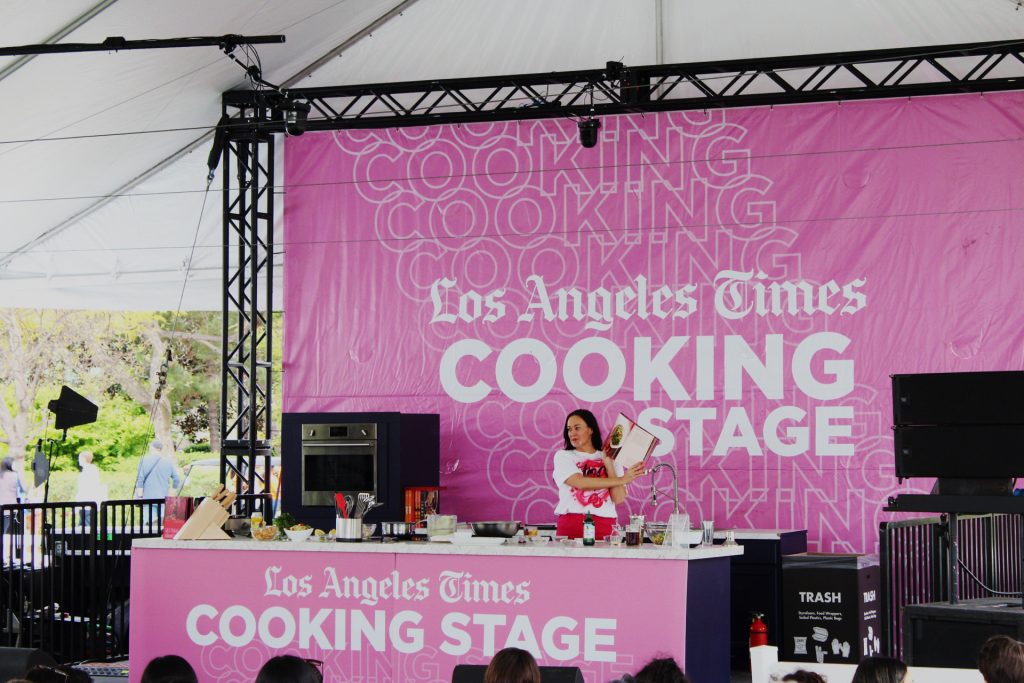
“Soul Bossa Nova” from the “Austin Powers” films welcomed the comedian, actress and now author of the cookbook “All I Think About Is Food,” Mamrie Hart to the Cooking Stage on the LA Festival of Book’s second day. Being a vegetarian, Hart found that eating out could sometimes be an issue – the martinis were also a lot more expensive. Additionally, she loved cooking for her friends but they didn’t want bland meals of only vegetables. So that was why she showed her audience how to make vegetarian meals decadent, fun and vegetarian friendly.
Since her cooking demo was at 11 a.m., Hart started by making a cocktail – gesturing to the shaker saying, “This is my church.” She made a drink she calls a “Goodbye Earl,” which was a whiskey based drink flavored with earl gray tea instead of a liqueur, noting that tea bags were a budget-friendly substitute for expensive mix-ins.
Sufficiently lubricated, Hart literally broke down the main dish as she started massaging broccoli florets for her Broccoli Salad Spring Rolls. These tiny trees were something the comedian absolutely loved, comparing her affection towards them to that of a petting zoo turtle. Some additional vegetables and some red wine vinegar later, Hart attempted what she called the scariest part of her presentation – preparing the rice paper. After an intense few moments, the roll was wrapped and filled with the veggies. Hart said that she loves spring rolls because of how versatile they are and recommended everyone give them a “roll.”
The removal of Hart’s denim jacket symbolized that things were getting serious in the second half as she began to make lima bean hummus. Vegetarians, the comedian said, are forced to eat a lot of hummus and because of that, she wanted to add variety to this meat-free protein staple. She added lima beans and feta cheese to the usual mix of tahini and olive oil along with a series of spices because, just like the 90s girl group, she too likes to “spice up her life.”
Dishes completed, the comedian worked the crowd and took the audience’s many veggie-based questions. When asked who her cooking inspiration is, she instantly went to the Barefoot Contessa herself, Ina Garten. Loving how safe she makes cooking feel, Hart said this is an aspect she brings when entertaining her friends. Not only does she get them drunk before they even come over, but rolls with the punches because even if she messes up dinner, there’s always UberEats.
Growing up in the south, a land of Louisiana chicken pasta, fried chicken and muffalettas, Hart was asked about vegetable substitutes for southern comfort dishes. A major one was artichokes. In addition to making artichoke’s rockefeller, a twist on the classic oyster entree, she also loved throwing them in low country boils in lieu of ham hocks.
While Hart’s dietary restrictions have separated her from her culinary Southern heritage, – though glad to be disassociated from its political history – the comedian ended her demo on a moment of sincerity, saying how she uses her family’s traditional recipes to influence her vegetarian dishes.
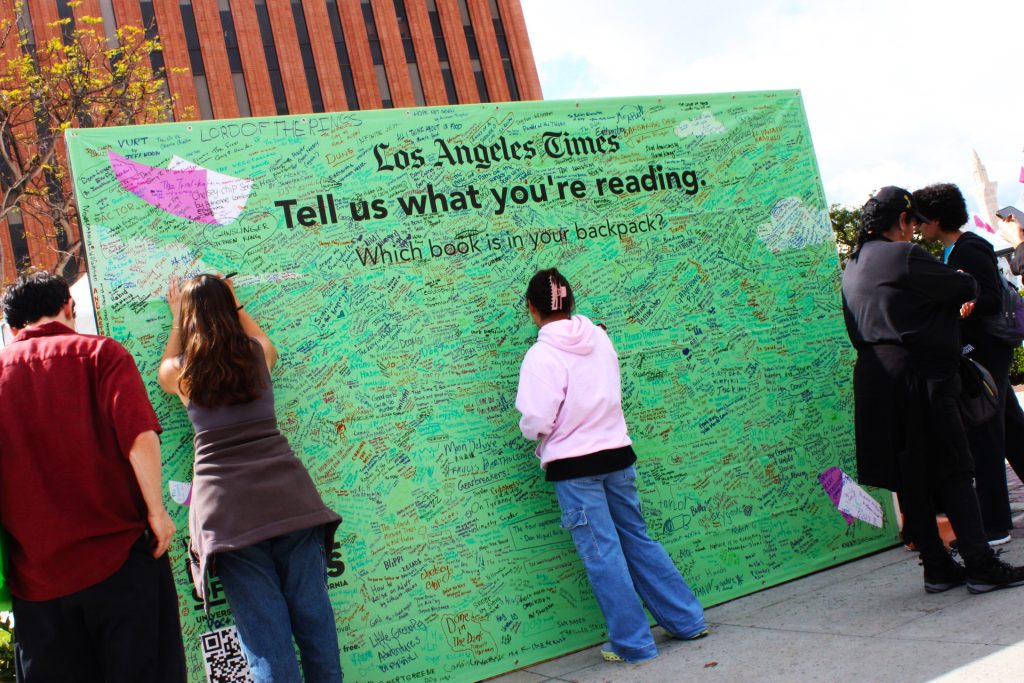
Festival goers share their newest paper-backed obsessions. Photographed by Gavin Meichelbock/BruinLife.
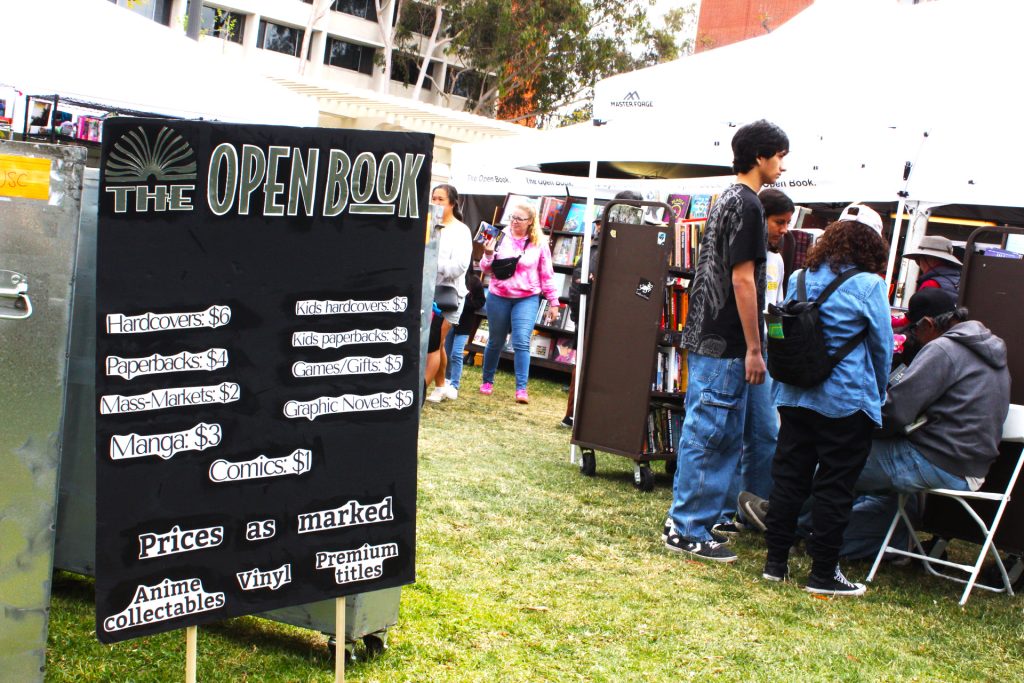
The Open Books sells a great selection at even better prices. Photographed by Gavin Meichelbock/BruinLife.
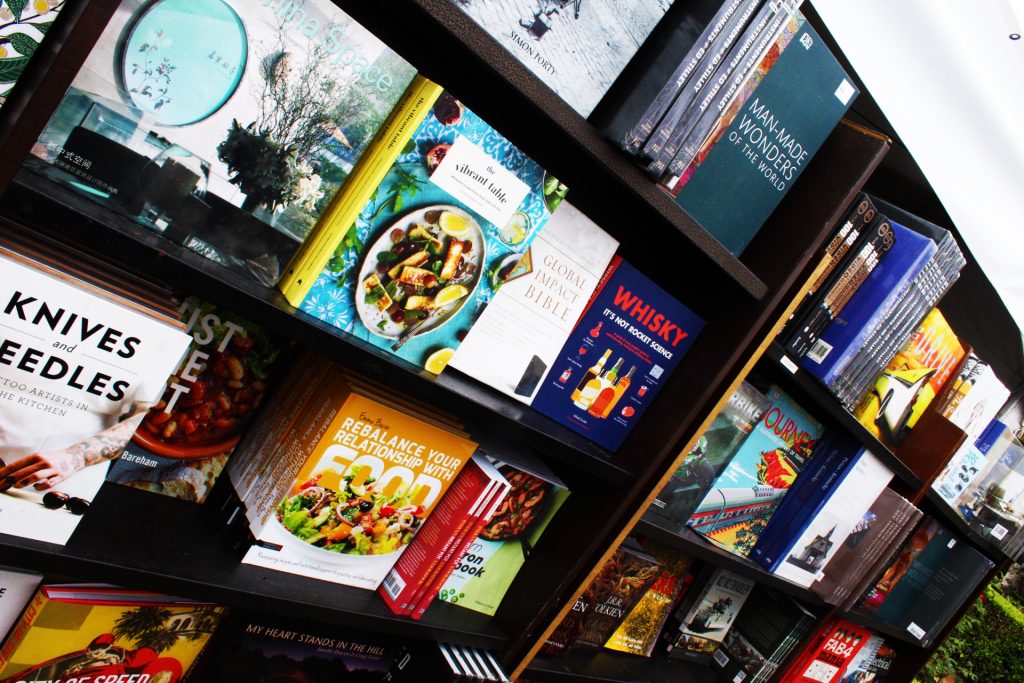
The Wonders of the World, whiskey tasting guides and cookbooks all come together on one self. Photographed by Gavin Meichelbock/BruinLife.
Man, Myth, or Legend? Political Biographies that Take a Second Look
(Left to right) Michael Hiltzik, Christopher Cox, Max Boot, Michael Vorenberg delve into their processes with political biographical writing. Photographed by Finn Martin/BruinLife.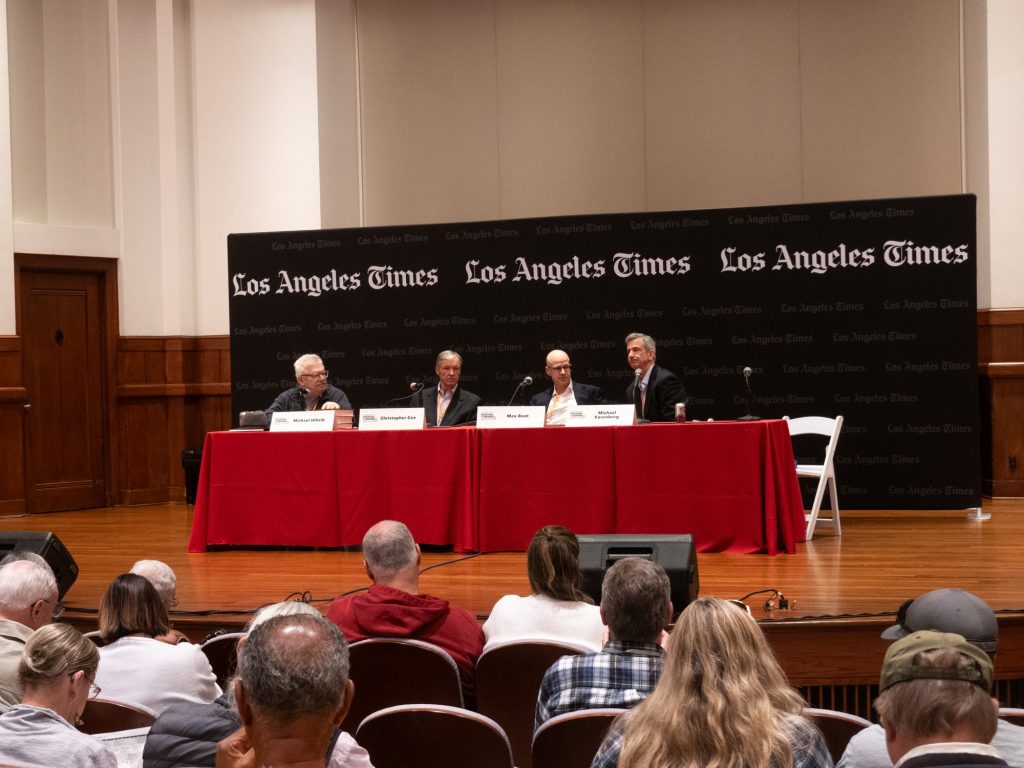
“Acts of devotion, acts of destruction; some fall in love, some detest them, but all seek to understand their subjects.” Michael Hiltzik, a Pulitzer Prize winning reporter for the LA Times, cut to the heart of a political biographer’s challenge in excavating the lives of history’s greatest figures. Asking three writers three simple questions, Hiltzik prodded out stories that speak to the biographer’s process:
“Woodrow Wilson: The Light Withdrawn” by Christopher Cox
More than 2,000 books have been written already about the life of President Woodrow Wilson, so when Christopher Cox, former U.S. Representative of California’s 40th congressional district, approached the story of the academic president he needed a unique angle. But Cox “started out writing about how it took so long for women to get the right to vote, and … backed into Wilson” from there. Cox’s novel grapples with the fact that a man lionized as a peace maker would be so opposed to women’s suffrage. Spending nearly 14 years on the project and pouring over the 69 volumes of material collected on President Wilson, Cox stumbled into “surprise after surprise after surprise to see in [Wilson’s] personal correspondence and meetings with people that his views were so very different from what he was trying to protest publicly,” that “his sympathy for Jim Crow in the South and his views on race ultimately animated” his opposition to women’s suffrage.
“Reagan: His Life and Legend” by Max Boot
The definitive book on Reagan just wasn’t enough for Max Boot. The Reagan family had already contracted a biographer to publish an all-revealing story about the President, but they did not anticipate Edwin Morris’ “odd book” which was a “combination of fact and fiction that inserted him as a fictional character in Reagan’s life.” So, writing in 2013 was at a sweet spot where Reagan was distant enough in the past for perspective but “close enough” so that he could “talk to a lot of those who were close to him.” Boot’s biography on Reagan developed for ten years, balancing the “great achievements” with the ”great failures.” How does a biographer weigh successes like working with General Secretary Gorbachev against failures like the tens of thousands of unattended deaths during the AIDs pandemic? By turning every single page in the record.
“Lincoln’s Peace: The Struggle to End the American Civil War” by Michael Vorenberg
Michael Vorenberg examined the idea of endings through the life of Lincoln and the many possible endings that followed him and his role in the American Civil War. Essentially, Vorenberg said, the story was that “the war comes to an end and there’s this great tragedy where Lincoln is assassinated before he can see over Reconstruction.” Because Lincoln’s life was so intertwined with the Union’s war effort, the vision for what a post-war, unified America could be was left to men of other persuasions. Lincoln, Vorenberg said, “understood the war was being led by the most upper-crust white southerners who had essentially hoodwinked the masses of the South to go along with them” and wondered how “the masses of the white Southerners can be brought to the Republican Party.” Through mismanagement and bitter memory, the North-South divide never quite healed. He said, “We face the same issue today. We wait for the voters of Trump to wake up and say they’ve been duped. But it’s not coming.” The Civil War might have ended with President Johnson’s proclamation, but Vorenberg was there to point at the scars we still wear.
Josh Gad, author of ‘IN GAD WE TRUST: A Tell-Some,’ in conversation with Jon Lovett
Josh Gad retells the story of the first time he spouted the F-word to a teacher. Photographed by Gavin Meichelbock/BruinLife.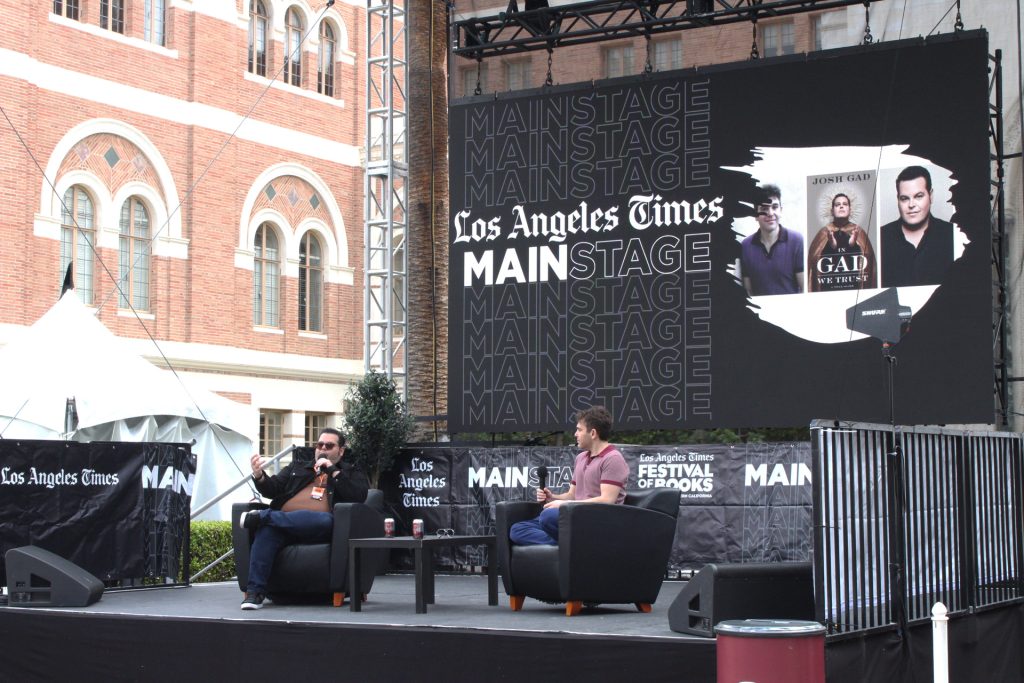
If his Jewish mother wasn’t upset about him giving up on his dream of acting to become a lawyer, audiences wouldn’t have the Josh Gad everyone knows and loved today. At the LA Time’s Main Stage of their Festival of Books, the actor let it go and explored the deeper meaning in his book, “In Gad We Trust: A Tell Some.”
While many children came to see Olaf, they were quickly surprised to see the Disney fan favorite spout the F-word. In high school, the first teacher he ever told “F– you” to was the same one who pushed him to be the best actor he could. Casting him as Tevye in his sophomore production of “Fiddler On the Roof,” Gad said how he stretched as a performer because he had to imagine what it was like being a father of six kids when he didn’t even have one.
After this dramatic start and nearly quitting acting because the women he loved at the time told him he was arrogant and “gay as hell,” Gad regained his footing three months later and went to Broadway which became his avenue into Hollywood. On his first night in the industry, Gad expected the city of stars but arrived in Jurassic Park – or more accurately, Jeff Goldblum in a bathrobe.
Since becoming more established as an actor, Gad talked about how lucky he has been to have worked twice with Judi Dench. Meeting on the production of “Murder on the Orient Express” and opening with the line, “Dame Judi Dench, more like Damn Judi Dench,” the two became fast friends before working on “Artemis Fowl” – much to Gad’s surprise as this low-brow movie sees him violently eat and poop dirt.
Even though Gad has reached enough acclaim to draw a massive crowd at a book festival, he said that the pressure never alleviates. He said he constantly feels at risk of losing his job, working with intense directors always makes him feel uncomfortable in his own skin and personally, always setting new goals only to be met with new obstacles. Despite some of this pressure coming from those who love him only wanting to push him farther, like his high school teacher, Gad said these moments still lead to periods of depression and anxiety.
One of such moments was when Gad reunited with his dad after 20 years. The actor said he fell out of contact with his dad after his parents divorced when he was six. Decades later, when Gad was in New York for a Broadway show, however, he said his dad asked to see him. Relating this moment to the song “Cat’s in the Cradle” – even singing a verse – Gad said that he was able to learn to love his dad in a new way that gave him closure to the feeling of abandonment he was left with as a child.
Audience questions ranged from inquiries about the production of “Spaceballs 2” to Gad’s typical weekend but landed on advice for dealing with bullies. Whipping out the F-word again, Gad said bullies are only bullies because they are jealous of the talent others possess and should never deter anyone from pursuing their dreams.
Jon M. Chu, author of ‘Viewfinder: A Memoir of Seeing and Being Seen,’ in conversation with Ashley Lee
(Left to right) Ashley Lee and Jon Chu discuss the director's journey from Los Altos to Wicked. Photographed by Finn Martin/BruinLife.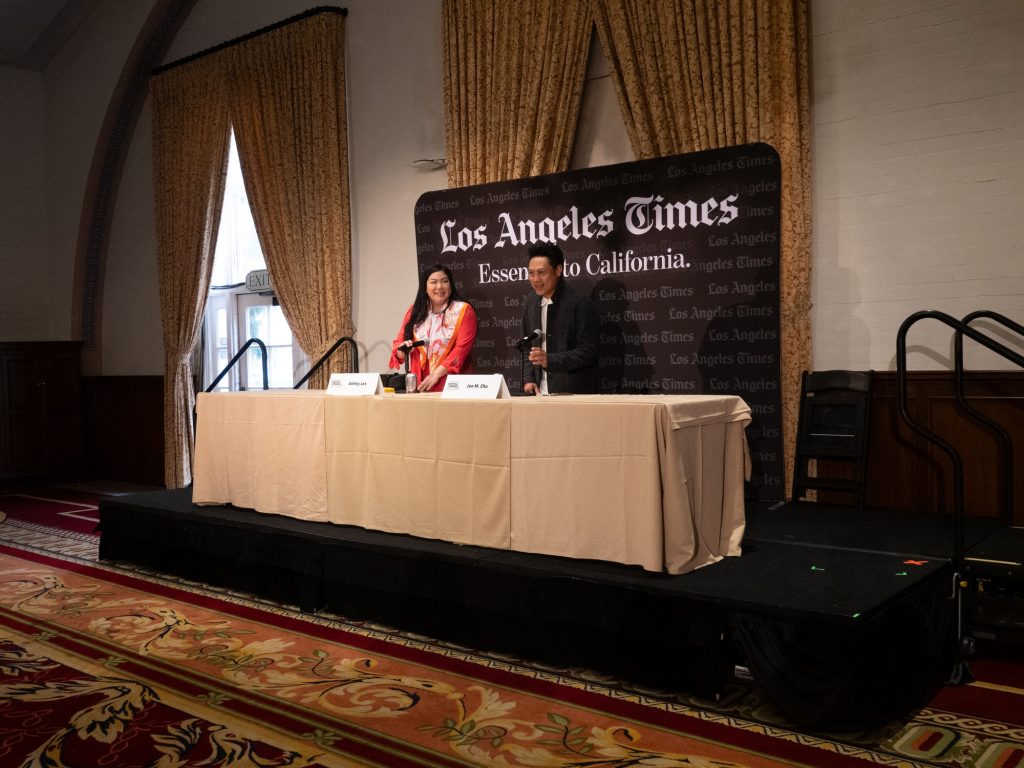
Jon M. Chu spoke at his panel much like how he makes his movies — by showcasing stories. When Ashley Lee of the LA Times Arts & Entertainment section asked Chu about his early relationship with technology, Chu candidly told the enrapt audience at USC’s Town and Gown about how his career was “born out of generosity of customers at my parent’s restaurant.”
Growing up in Los Altos, California, Chu was constantly surrounded by new and emerging technology and engineers in the industry. His parents ran a Chinese restaurant, Chef Chu’s, that is still standing 55 years later. When patrons of the restaurant would come in, Chu’s father would tell them about his son’s interest in technology, photography and filmmaking, which quickly turned into customers bringing in cameras, computers and more to pass on to a barely teenage Chu.
As Chu spoke so lovingly about his early relationship with technology, Lee brought things up to speed by asking his opinion on modern technology, specifically AI. Chu replied that he always saw technology as “never a threat but a tool” and admitted he feels as if he is starting to fall behind on current technology. Chu said he is torn between being unforgiving until AI fixes its “original sin” of taking data and swallowing the pill that AI will never fix its “original sin,” and that he must begin to learn how to deal with AI.
The second anecdote of the afternoon was quite literally a page out of his book, “Viewfinder: A Memoir of Seeing and Being Seen.” With what Lee called a LA Festival of Books tradition, Chu read an excerpt from his book that details his experience meeting his hero, Apple founder Steve Jobs, at the Oscars. Harry Shum Jr., actor and author who was also attending this year’s festival, was a side character in the story, acting as the catalyst for the fateful meeting between a young Chu, who was at the Oscars not for directing — but for his dance group — and Jobs. Chu was able to tell Jobs that he was thankful for all the tools he created, and Jobs joyfully called Chu his “neighbor” and told him he had visited his dad’s restaurant, much to Chu’s surprise. Chu got noticeably emotional when retelling the moment he found out of Job’s passing.
The conversation eventually turned towards Chu’s impressive filmography, which includes “In the Heights,” “Catch Me If You Can 2,” “Step Up 2,” “Crazy Rich Asians” and most recently and perhaps most notably, “Wicked.” A fan in the crowd took their chance to ask which “Wicked” line resonated with Chu the most, to which he answered, “Something has changed within me; something is not the same” from the dramatic finale track “Defying Gravity.” Chu briefly talked about his upcoming projects, the most publicized one being “Wicked: For Good” — to which Lee cracked a joke about Chu’s hypothetical second novel being titled “Viewfinder: For Good.” Other projects include the “Crazy Rich Asians” TV show and stage musical, the Britney Spears biopic based on her memoir and a neither confirmed-nor-denied adaptation of the video game “Split Fiction.”
Sitting in the audience of Chu’s panel, it was hard to believe that a director with 11 Best Director nominations and one of the most talked about blockbuster movies as of late was speaking, as he took the time to share relatable stories and thank audience members who complimented his work. Chu, who was announced as the USC commencement speaker this year, made sure to shout out his alma mater multiple times, showing both his Trojan and Californian pride. One of his final words to the audience was advice to chase your most ambitious dreams, and not let hate, blame or fear hinder you from the long journey of shooting beyond the imaginable.
Now Streaming: A Closer Look at the TV Shows that Made Us
An ex “The Bachelor” contestant, a Pulitzer Prize winner and a culture writer with an expertise in 2010s Disney Channel got together in Mudd Hall to uncover the dirty truths about television. Matt Brennan led the panel consisting of Rachel Lindsay, Emily Nussbaum and Ashley Spencer to inform audiences about the realities of stardom and its devastating aftermath during their talk, “Now Streaming: A Closer Look at the TV Shows that Made Us.”
The impact of television growing up was not one lost on Lindsay. Being raised on “The Real World,” she was exposed to how different people lived their lives outside of her sheltered, religious household. Jealous that these TV personalities were living their life how they saw fit as opposed to how the “should” be living it, Lindsay went on “The Bachelor” looking for an escape but became more restricted than ever. Ripped away from her loved ones that informed who she was, she was forced to fit the character type the show expected of her – regardless of the fact that it didn’t properly reflect who she really was.
Flipping from women in their adult years looking for love to child actors, Spencer broke down the factors that made 2010s Disney Channel a factory for young talent. While the programming existed back in the 80s, it wasn’t until the 00s with the breakout success of Justin Timberlake and Britney Spears – both “Mickey Mouse CLUB” alums – that Disney realized that they could combine their record labels and TV shows to capitalize on the success of their child stars.
In regards to the series themselves, Spencer said how, due to the influx of unscripted game show television, Disney, along with other kids entertainment networks, inherited seasoned sitcom writers who wouldn’t have traditionally taken a job on “lesser programing.” The access to this talent was what led to the mass successes of “Hannah Montana” and “Sonny with a Chance” that eventually led to the overnight success of Miley Cyrus and Demi Lovato.
While this success gave these rising stars celebrity status and lots of money, it created a complicated family dynamic that existed as a problem throughout the industry. Spencer noted that with the mainstream success of these young actors, they became the breadwinner of their families. While the kid’s parents would become their managers, the child was still the one with the money and essentially ran the house. In the case of Lovato, Spencer referenced how the Disney star’s mom couldn’t take away her phone because she bought it with her own money.
This topic went outside of merely Disney Channel and into reality TV as a whole. Nussbaum brought up the disaster of “Kid Nation” and how a child was badly burned with cooking oil while filming. All three panelists agreed that a child working in Hollywood should still qualify as a form of child labor because it exposes them to a slurry of situations they are not emotionally mature enough to handle – even stunting most adult reality TV contestants.
In the end, it doesn’t matter what age demographic television stars are a part of, complicated contracts and NDAs will always negatively impact these people’s lives in one way or another.
Good on Paper: The New Romantic Comedy in Contemporary Fiction
Love is in the air at the panel "The New Romantic Comedy in Contemporary Fiction." Photographed by Gavin Meichelbock/BruinLife.
Romance author Elissa Sussman led a discussion with the all female panel of Amy Spalding, Celia Laskey, Hannah Brown and A.C. Robinson to a room packed till the last row. A majority of the crowd was women. Each author spoke candidly and humorously about their experiences writing a modern fictional romantic comedy, from how they approach tropes to the process behind drafting intimate scenes.
Spalding started out in the young adult genre, before drawing inspiration from Jasmine Guillory’s “The Wedding Date” to eventually penning her lesbian rom-com series “Out in Hollywood.” The series’ recently published third installment, titled “On Her Terms,” showcased the fake dating trope. Spalding said that she began to think more about tropes after realizing how much readers love them. Now, she tries to think of new and exciting ways to play with the tropes and imagine them happening to real people. The fourth and final installment of the series is set to come out next year, with Spalding teasing the topic to be centered around a second chance romance.
Laskey’s “Cover Story” is another lesbian romcom that follows an agent who keeps her client in the closet but eventually falls for her. Laskey had a lot to say about the intimate scenes in her writing, stating that she was inspired by the “ten-page sex scene” in Casey McQuinston’s “Red White & Royal Blue,” a book that she considered “her Bible” when it came to writing her novel. Different from all the other novels, Laskey’s book is set in 2005, which she said originated from multiple notes from publishers that believed it was unrealistic for her story to be set in the present day as “no celebrities are closeted anymore.” While Lasksey admitted that the change gave her novel a fun nostalgia and texture, her book is still relevant to today for all the celebrities who may still be in the closet.
Brown, who may be better known for her time on TV as the Bachelorette and as the winner of “Dancing With the Stars Season 28,” made it clear that she is perfectly happy stepping out of the spotlight and writing other love stories for people to enjoy instead. The sequel to her debut book “Mistakes We Never Made” is set to be released in June of this year titled “The Four Engagement Rings of Sybil Rain.” Brown is a big fan of second chance romance, with both of her books following the popular trope. The thing Brown struggled with most when writing her upcoming novel was the characters — worrying about the un-likeability of her protagonist who leaves a man at the altar and her two ex-fiances who initially seemed too good to be true, Brown expressed pride at the book she has finally sent to publish.
Robinson’s novel “Hardly Strangers” is about an interracial couple in Silverlake, with the story and normal person/celebrity trope based largely on her own experiences with love. What stuck out the most about Robinson’s authorial process was the amount of immersive research she did to create her novel. Robinson stated that she would sometimes approach her boyfriend to block out certain intimate scenes to ensure they were realistic. When asked the final question of what was the weirdest thing the authors had to search up while writing, Robinson told an anecdote of calling three random Irish people to study their language and ask about their colloquialisms to use for her book’s Irish love interest.
At the end of the day, all panelists seemed to testify to writing what they wanted to read and see in the publishing industry. Robinson said she “set out to write something I wanted to see,” which was the story of an interracial couple where race was “not necessarily the mountain they [had] to climb” and simply “allowing people to be people.” Spalding, who knew her new character Chloe could be seen as messy, advised the crowd that the only way to get through the obstacle of worrying about being liked is to not care. All four writers emphasized that staying true to their craft is what defines their novels and fills rooms with avid fans waiting to see them.
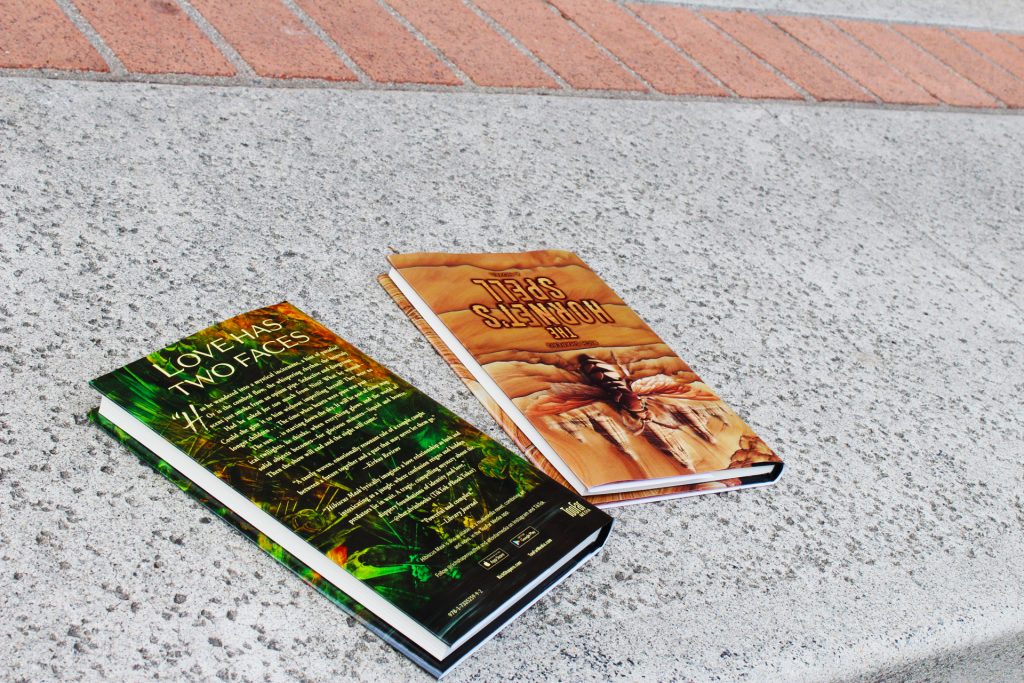
Disposing of books is disrespectful, paper doesn't grow on trees. Photographed by Gavin Meichelbock/BruinLife.
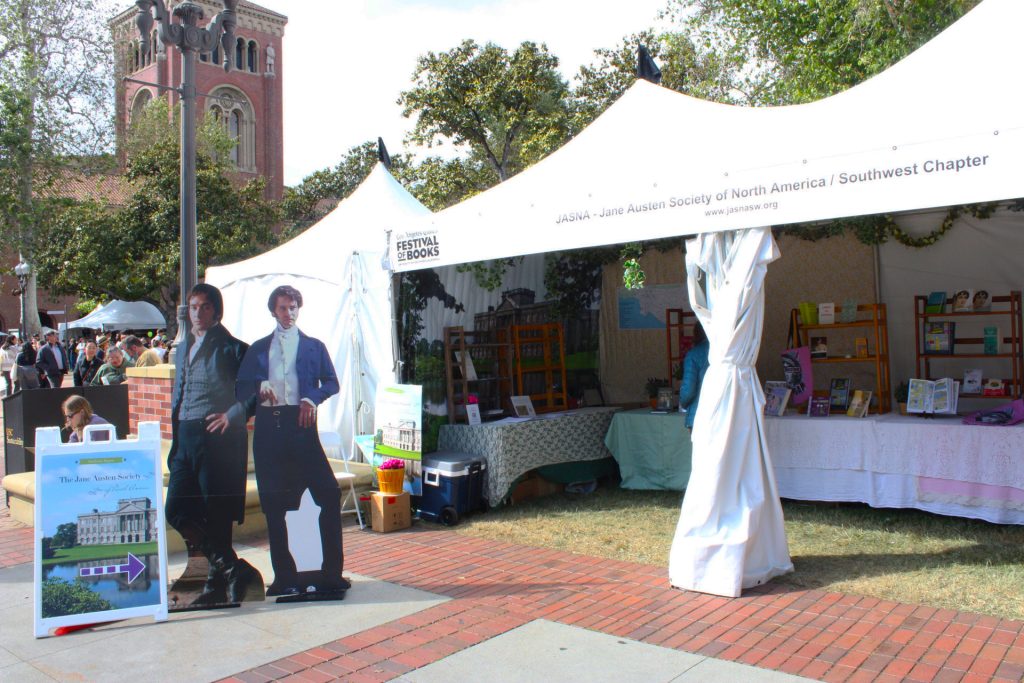
No pride nor prejudice was found at the Jane Austen Society of North America's Booth. Photographed by Gavin Meichelbock/BruinLife.

